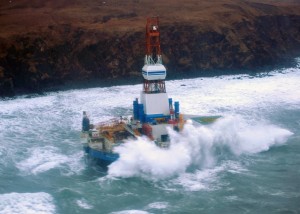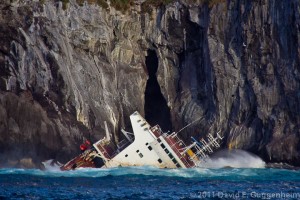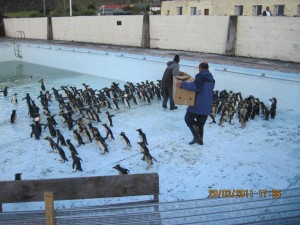Save Penguins and Threatened Wildlife at Earth’s Remotest Places
/in Featured, Nightingale Island Disaster Penguin & Seabird Rescue, Tristan da Cunha, Nightingale Island, Inaccessible Island/by Ocean Doctor| [youtube gm_ijHoMZ6I 560 340] |
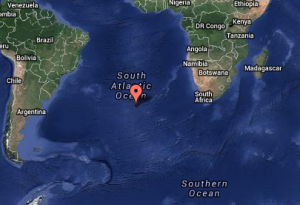
Tristan da Cunha, the world’s remotest inhabited island, is located in the South Atlantic
On March 16, 2011, a horrific environmental disaster occurred at the most remote inhabited island group in the world, Tristan da Cunha, that threatened the second largest concentration of seabirds in the world.
Marine scientist Dr. David E. Guggenheim, president of Ocean Doctor, was aboard a ship that received a distress call from a Maltese freighter that had run aground at Nightingale Island. The catastrophic oil spill that ensued was captured on film, and Dr. Guggenheim has turned that footage into a film that explores this tragedy and others like it, as a warning signal and call to action to prevent future tragedies and prepare local managers for any that might occur.
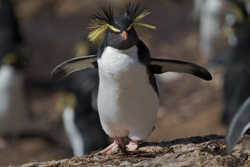
The beloved Northern Rockhopper penguin has declined 90 percent over the past 50 years and is now an endangered species
World Penguin Day 2013
/in Featured, Nightingale Island Disaster Penguin & Seabird Rescue, South Atlantic Ocean, Tristan da Cunha, Nightingale Island, Inaccessible Island/by Ocean DoctorLessons of BP Deepwater Horizon: Unlearned and Now Unleashed in Alaska
/in Featured, Gulf of Mexico, Nightingale Island Disaster Penguin & Seabird Rescue, Ocean Doctor's Reflections, Tristan da Cunha, Nightingale Island, Inaccessible Island, USA & Territories/by Ocean DoctorJust a short time ago the world was mesmerized by a mile-deep live feed of an unstoppable tempest of brown crude and an unprecedented frenzy of human activity undertaking desperate, inadequate attempts to halt the flow and skim, burn, disperse, and boom the rest. In the countless hearings by Congress and the National Commission on the Deepwater Horizon Oil Spill and Offshore Drilling that would follow, talk of a cold, distant frontier was unavoidable: The chilling thought of such a disaster occurring in the Arctic, where remoteness, vastness, heavy weather and unforgiving seas combine to make even simple tasks at sea profoundly more difficult. In the face of the largest oil spill in history, many of us found consolation in that we were finally paying attention to the perils of offshore drilling and these lessons would finally be learned.
What BP Deepwater Horizon illustrated vividly was that civilization’s striking advances in deepwater drilling have far outpaced its ability to clean up should a disaster occur. Perhaps the most chilling of all the Congressional testimony was the revelation by oil company CEOs that the essence of their plan for dealing with a catastrophic oil spill was to not have a catastrophic oil spill. A great idea on paper, but in the real world, an arrogant denial of the limits of technology, human error, and Mother Nature’s merciless power. Read more
The Gentleman Biologist of Pier 39
/in Cape to Cape Expedition, Nightingale Island Disaster Penguin & Seabird Rescue, Podcast, South Atlantic Ocean, Tristan da Cunha, Nightingale Island, Inaccessible Island, USA & Territories/by Ocean Doctor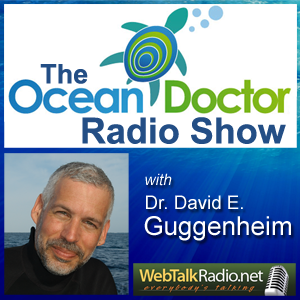 |
April 25, 2011: Take a walk out to the end of San Francisco’s Pier 39, and you’ll hear an interesting symphony of barking California sea lions and reactions of delight and amusement from droves of human onlookers. And if you’re lucky, you might also find the “Gentleman Biologist of Pier 39,” Tim Vogel, a volunteer at the Marine Mammal Center in Sausalito, who has pursued tech career in Silicon Valley but has never forgotten his Seacamp roots. He spends hours teaching and inspiring visitors about the incredible wildlife of the West Coast and the wonders of science. Also: An update on the penguin rescue effort from Tristan da Cunha by Trevor Glass, Director of the Department of Conservation there.
The Ocean Doctor airs weekly on WebTalkRadio.net. Want to listen on your iPod, iPhone or mp3 player? Download the mp3 file or subscribe on iTunes and don’t miss a single episode. See the complete list of episodes.
Follow The Ocean Doctor on Twitter — Become a Fan on Facebook!
Submit a question and I’ll try to answer it on the air. Even better, record your question or comment on our special message line and I might play it on the air. Call: (805) 619-9194. You can also leave questions and comments for this episode below.
Like the show? Learn how to become a sponsor. Read more
Podcast: Play in new window | Download
A Statistically Impossible Plea for Help
/in Featured, Nightingale Island Disaster Penguin & Seabird Rescue, Ocean Doctor's Reflections, South Atlantic Ocean, Tristan da Cunha, Nightingale Island, Inaccessible Island/by Ocean Doctor
EARTH DAY 2011: This isn’t what I had planned to write for Earth Day. But it’s the most important thing I can write today. I write these words with a single, challenging purpose: I need you to care deeply about something. I need you to care about something that wasn’t supposed to be possible. I need you to care so deeply that you choose to help. And to make things even more challenging, what I need you to care about is a place you’ve never heard of and are very unlikely to see in your lifetime, a place that’s such an infinitesimally tiny speck lying quite literally in the middle of the South Atlantic Ocean, it appears on few maps (and even befuddles Google maps). And unless you’re one of the fewer than 300 people that call Tristan da Cunha home, it will take you at best 5-7 days to get to this airstrip-lacking place even if you dash out the door before finishing this paragraph. Tristan da Cunha is, quite literally, the most remote inhabited island in the world. A sign on the island boasts this factoid, alongside a marker pointing east toward the nearest civilization: 1,511 miles to Cape Town, South Africa. Read more
VIDEO: Dramatic Rescue of Freighter Crew by Prince Albert II Expedition Team, Penguin Rescue (CNN)
/in Cape to Cape Expedition, Featured, Nightingale Island Disaster Penguin & Seabird Rescue, Ocean Doctor's Reflections, South Atlantic Ocean, Tristan da Cunha, Nightingale Island, Inaccessible Island/by Ocean Doctor|
|
Dramatic video shot by Kristine Hannon details the rescue of 12 crew members aboard the bulk carrier, “Oliva,” on March 17, 2011, where it grounded the prior day. Within hours of the successful rescue, the ship broke in two and sunk, unleashing a massive oil spill, threatening millions of seabirds including the endangered Northern Rockhopper penguins. Read more
The Great Penguin Rescue
/in Cape to Cape Expedition, Nightingale Island Disaster Penguin & Seabird Rescue, Podcast, South Atlantic Ocean, Tristan da Cunha, Nightingale Island, Inaccessible Island/by Ocean Doctor |
April 4, 2011: Our guest this week, penguin expert, Dyan deNapoli, “The Penguin Lady,” former Senior Penguin Aquarist at the New England Aquarium, talks about her new book, The Great Penguin Rescue. with important lessons — and hope — for the desperate penguin rescue and rehabilitation efforts underway following the tragic oil spill at Nightingale Island in the South Atlantic. Also: An update on the rescue effort from Tristan da Cunha by Katrine Herian of the Royal Society for the Protection of Birds.
The Ocean Doctor airs weekly on WebTalkRadio.net. Want to listen on your iPod, iPhone or mp3 player? Download the mp3 file or subscribe on iTunes and don’t miss a single episode. See the complete list of episodes.
Follow The Ocean Doctor on Twitter — Become a Fan on Facebook!
Submit a question and I’ll try to answer it on the air. Even better, record your question or comment on our special message line and I might play it on the air. Call: (805) 619-9194. You can also leave questions and comments for this episode below.
Like the show? Learn how to become a sponsor. Read more
Podcast: Play in new window | Download
VIDEO: Oil Slick Threatens Endangered Penguins (CNN International)
/in Cape to Cape Expedition, Featured, Nightingale Island Disaster Penguin & Seabird Rescue, Ocean Doctor's Reflections, South Atlantic Ocean, Tristan da Cunha, Nightingale Island, Inaccessible Island/by Ocean Doctor|
|
Dr. David E. Guggenheim, the “Ocean Doctor,” is interviewed about the tragic oil spill at Nightingale Island and rescue operations to save the endangered Northern Rockhopper penguins. Read more
Desperate Penguin Rescue Efforts Continue: Nearly 3,000 Penguins Relocated from Nightingale
/in Cape to Cape Expedition, Featured, Nightingale Island Disaster Penguin & Seabird Rescue, Ocean Doctor's Reflections, South Atlantic Ocean, Tristan da Cunha, Nightingale Island, Inaccessible Island/by Ocean DoctorDuring a briefing by The Ocean Foundation to the conservation NGO community in Washington, DC, Katrine Herian, a project officer of the Royal Society for the Protection of Birds (RSPB) stationed at Tristan da Cunha, informed us by telephone that the desperate effort to rescue endangered Northern Rockhopper penguins from neighboring Nightingale and Inaccessible Islands (the latter a World Heritage Site) continues, with roughly 2,300 penguins already relocated for rehabilitation on Tristan da Cunha and another 600 birds expected last evening. Read more
Fax: +1 (202) 888-3329
P.O. Box 53090
Washington, DC 20009
Just Released: The Remarkable Reefs of Cuba: Stories of Hope from the Ocean Doctor by Dr. David E. Guggenheim, President of Ocean Doctor


